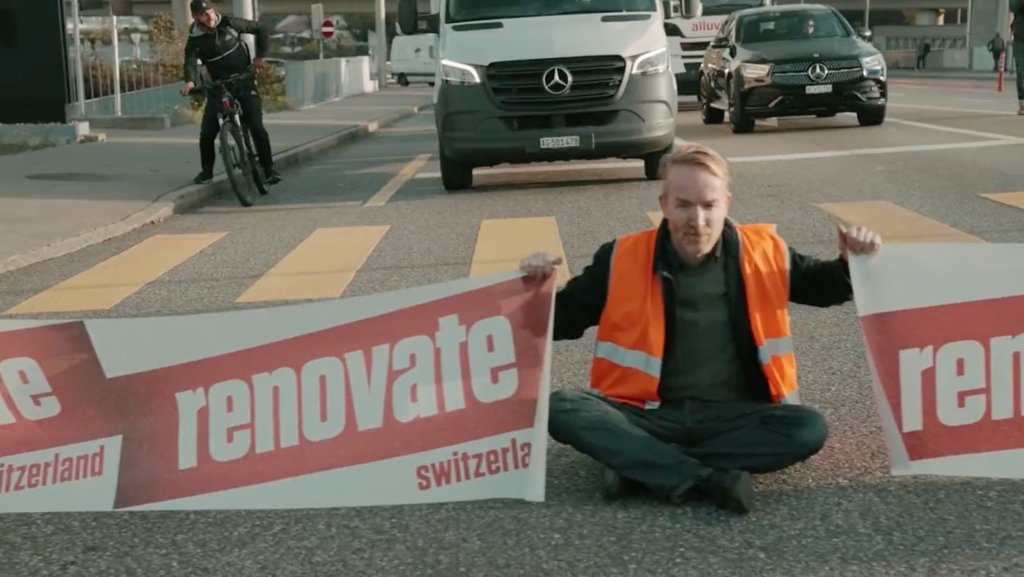They made headlines last week by supergluing themselves to the UK’s business and energy department. Then they spray-painted three government buildings and, to top it all off, on Saturday convened thousands to blockade five bridges in central London.
All that was in a week’s work for the newly-formed environmental campaign group, Extinction Rebellion (XR). They appear to be serious about the rebellion part, with the number of arrested members so far pushing 150.
Videos by VICE
In fact, the protesters don’t run when the police flock around them – they hold their spray-paint smeared hands in the air to show culpability for their crime. With each arrest, protesters cheer – because trouble with the law is precisely what they want. They say law-breaking is vital for social movements to effect change. And – as California burns and UK politicians suffer apparent amnesia about the 12-year doomsday clock issued by the IPCC last month – XR believe change has never been so essential.

One woman advocating civil disobedience is Gail Bradbrook, XR co-founder, mother of two and NGO consultant. (Incidentally, she’s also a keen rock climber – a useful skill if you’re planning on scaling government buildings to daub them with anti-fracking messages.) Bradbrook says the environmental movement has exhausted all routes of non-criminal peaceful protest: “We know if we simply stand on a road holding a placard, the system just ignores it.” So, she says, they’re rebelling. Peacefully. Their actions are so peaceful that the spray-paint they use is washable with water. “Sometimes we even wash it off ourselves.”
The group use “prison workshops” to train people in civil disobedience and what prison is like. Co-founder Roger Hallam is put forward as walking proof that these tactics can work. He’s facing prison for campaigning to get King’s College to divest from fossil fuels last year, going on hunger strike and spray-painting the campus. Within eight weeks the college had reversed its policies. Hallam is flippant about the prospect of going to prison, having been already (“four or five times”) and saying he enjoyed every minute of it. But when it comes to the cause, he’s nothing but sincere: “This is about people’s kids and their futures. It’s a moral and emotional situation. It’s not some game we’re playing.”

So, how big a deal is this? Well, don’t expect immediate success. The group, critics say, is certain to fail by its own vague and highly ambitious standards. They want a “wartime-like mobilisation of society” to get to net zero carbon emissions by 2025. In layman’s terms, that means 100 percent electric cars, 100 percent renewable electricity, all boilers replaced and probably no flying, or steel and cement production. The forthcoming UK target is expected to be 2050 at the earliest.

They’re calling for a randomly selected 1,000-strong “citizen’s assembly” to work alongside government in guiding the green transition. This isn’t utopian nonsense: in Ireland, a similar 2016 initiative has been credited with facilitating the 2018 abortion referendum.
An assembly convened by XR on Westminster Bridge on Saturday made suggestions like rationing air travel, relocalising food production and granting rights to the earth as a living being. They say they’re making a blueprint for a new society. Critics say they’re setting themselves up for failure.

There’s certainly no guarantee the group’s methods will be effective. They’ve been accused of cherry-picking successful examples of civil disobedience from history. XR itself says it needs 3.5 percent of the population on board for the strategy to change anything. That’s over 2 million people. At the moment, their Facebook following has only just passed the 30,000 mark.
That said, they are gaining hundreds – sometimes thousands – of followers daily, and they’ve already received interest from at least 25 countries. Civil disobedience on the scale being proposed may be unprecedented – but then so is the gravity of the crisis ahead.

For those already involved, the movement is inspiring wild self-sacrifice; 82-year-old Phil Kingston, who’s regarded in the movement as something of a stalwart of last week’s actions after clocking up three arrests, says he is “hoping to make it to prison”. He says, “Our grandchildren and people in developing countries are going to have such a hard time of it that me going to prison is neither here nor there.”
Teddy Woolnough, who’s 18, has given up full-time dance education to dedicate herself to XR and plans to engage in civil disobedience next year. “There is the worry of the future,” she says, “but we won’t have a future if we don’t do something about it anyway.”
Sitting on Lambeth bridge on Saturday, an occupier – 51-year-old careers advisor and first-time lawbreaker, Paul – said this was his generation’s 1939 moment. “This threat is bigger than the Nazis for us,” he said. “It’s existential. How do I explain it to my children if I don’t sit in this road?”




